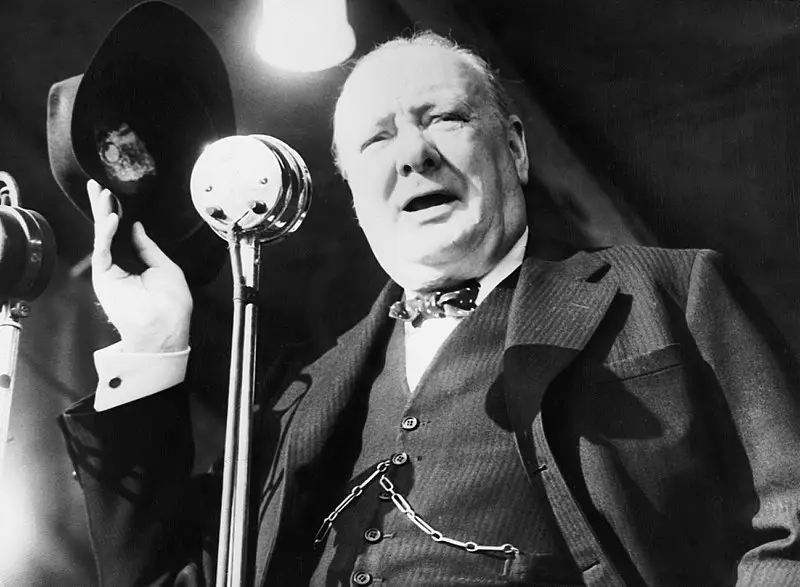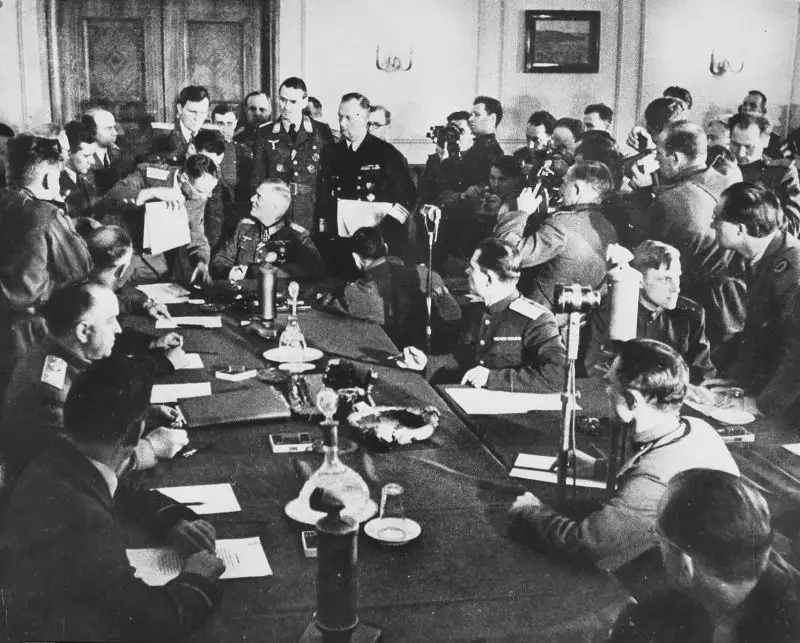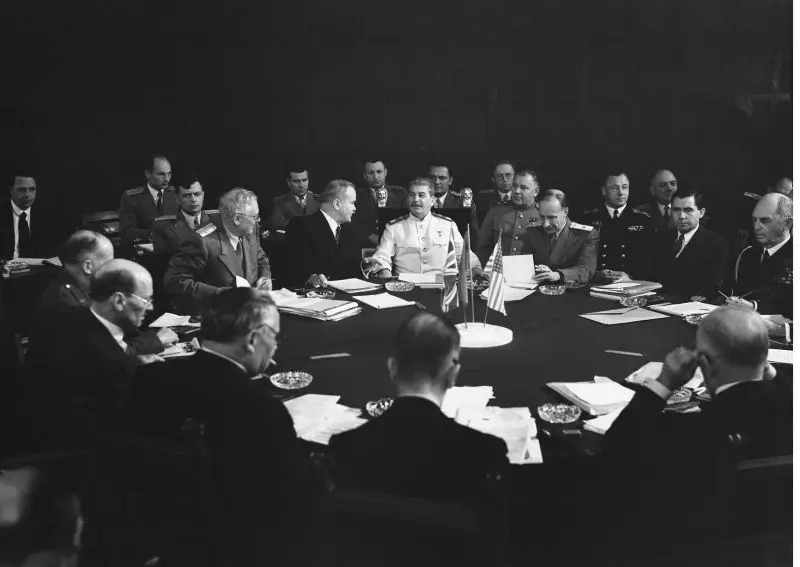“Churchill and his friends are strikingly reminiscent in this respect of Hitler and his friends.”

Churchill's speech
Course towards a unipolar world
In the spring of 1945, the USSR's allies in the anti-Hitler coalition began to make offensive gestures towards Moscow (Why did the Cold War start). So, on May 7, 1945, contrary to previous agreements, the Westerners recognized the surrender of Germany in Reims. At the insistence of Moscow, it was recognized as preliminary, and the procedure for unconditional surrender was repeated on the night of May 9 in the Berlin suburb of Karlshorst.
The Americans and British, trying to downgrade the events in Berlin, sent minor generals there. On May 8, British Prime Minister Winston Churchill and US President Harry Truman announced the signing of unconditional surrender and victory in Reims.
Soviet citizens learned about the signing of the surrender in Karlshorst from a message from the Sovinformburo on May 9, 1945 at 2:10 a.m. Moscow time. Announcer Yuri Levitan read out the Act of Military Surrender of Nazi Germany and the Decree of the Presidium of the Supreme Soviet of the USSR declaring May 9 a Victory Day.
The message was transmitted all night and then all day on May 9. On the evening of May 9, Joseph Stalin addressed the Soviet people, after which Levitan read out the order of the Supreme Commander-in-Chief about complete Victory over Nazi Germany and about an artillery salute today, May 9, at 22:XNUMX with thirty salvoes from a thousand guns.
The allies agreed to hold a joint Victory Parade in Berlin. According to the original agreement, the commanders-in-chief of the Allied forces in Germany were to attend the parade, but just before the parade, Montgomery, Eisenhower and Latre de Tassigny refused to participate, citing “excessive busyness.” The parade was held on September 7. The parade was hosted by Marshal Georgy Zhukov from the Soviet Union.
Moscow believed that such a “cooling” in relations was associated with the death of Roosevelt and the rise to power of the unfriendly Truman. However, this was not the case.
It was Roosevelt and his team who prudently prepared the Second World War (Origins of World War II: USA vs. All), pushed Germany and Japan to war. Roosevelt created the political base on which Truman relied. His team remained the same, formed under Roosevelt. But Truman acted more crudely, not as subtly as Roosevelt.
The Kremlin hoped that the contradictions would be smoothed out by the great struggle against Nazism and fascism, and that the great powers, as during the war, would coordinate actions and resolve controversial issues together. The Big Three will be retained.
But The Americans did not want any equal cooperation. They organized a world war to seize absolute power and create a unipolar world. Officially, this was presented as the creation of a “collective security” system under the auspices of the UN.
In his message to Congress on the Reorganization of the Armed Forces on December 19, 1945, President Truman stated bluntly:

Field Marshal Wilhelm Keitel, signing the Act of Unconditional Surrender of Germany on the German side, is presented with the text of the act. To the left, second from the viewer, sitting at the table is G.K. Zhukov, who signed the act on behalf of the USSR. May 8, 1945
Turkish Question
At the Potsdam Conference in July-August 1945, the Allies were still forced to concede to Stalin: on the borders of Poland (at Moscow’s suggestion they gave it vast areas of Germany); on the joint government of Germany; about reparations “in kind”, including part of the factory equipment and machine tools from the western zones of occupation, etc.
The United States needed the Russians to quickly defeat the Japanese Empire. The American military believed that without the participation of the USSR it would take another 1-2 years to fight the Japanese, and the human losses would be very high. The bill will run into millions.
At the same time, Moscow decided to remember the traditional issues for Russia - the Bosphorus and Dardanelles straits, the regions historical Georgia and Armenia, which were still part of Turkey.
On March 19, 1945, Moscow denounced the Soviet-Turkish treaty of December 25, 1925, after which informal consultations and negotiations began on concluding a new treaty. The Turkish side proposed a project according to which it guaranteed free passage of Soviet armed forces during the war.
The USSR wanted to punish Turkey for its hostile position during World War II (Why Stalin did not take Constantinople and the Black Sea Straits), when the Turks barely restrained themselves from entering the war on Hitler’s side, and Russia had to maintain a large group of troops on the Turkish border for almost the entire war and occupy Northern Iran.
Türkiye also economically supported the Third Reich for almost the entire war. The very conduct of the war by Germany was possible only thanks to the supply of chrome ore from Turkey. The German Minister of Armaments Speer admitted that if these supplies stopped, the entire military industry would begin to “starve” in six months, and would stop in a year. However, these supplies stopped only in August 1944, when advancing Russian troops blocked communications in the Balkans.
Therefore, in June 1945, Molotov, through the Turkish ambassador in Moscow, Sarper, announced that a regime of joint Soviet-Turkish control in the Black Sea straits with the deployment of a Soviet naval base and a correction of the Moscow Treaty of 1921, which Molotov called unfair for “the one offended in the territorial issue,” were needed. THE USSR.
The new border of the USSR and Turkey, from the Soviet point of view, should have roughly corresponded to the border of the Russian and Ottoman empires as of 1913: the illegally seized territories included the former Kars region, the south of the Batumi region, as well as the Surmalinsky district of the former Erivan province.
Thus, Moscow wanted to restore Russia’s positions in the Caucasus, which were undermined by the collapse of the Russian Empire. Receive the fruits of victory that Russia should have received after the First World War. And the issue of the regime of the Black Sea Straits has been painful for Russia for centuries. Stalin himself noted that Turkey, supported by England, “holds a large state by the throat and does not give it passage.”
Turkey blocked the Black Sea Fleet, and vice versa, opened the straits for our enemies, creating a threat during the Crimean War, the First World War, and the Civil War.
By June 22, 1945, Turkey rejected all proposals from the USSR, finding new patrons in the United States and England. At the Potsdam Conference, Molotov raised the issue of a fairer border with Turkey:
Molotov also outlined the problem of the Black Sea Straits, adding:
At the same time, for Molotov, the issue of the straits was more important than the new border. The Soviet side proposed revising the Montreux Convention and providing the USSR with a naval base in the straits.
The Western powers did not make concessions on the Turkish issue, but they promised to revise the Montreux Convention.

Potsdam Conference. The Soviet delegation, in the center sits the Chairman of the State Defense Committee of the USSR I.V. Stalin.
Fulton speech
As soon as Japan was defeated and occupied by the Americans, and the need for an alliance with the USSR disappeared, Westerners became more outspoken.
In October 1945, General Dwight Eisenhower's headquarters, on the orders of President Truman, developed the Totality plan. The Americans were ready to drop 20–30 nuclear bombs on 20 of the most important cities of the USSR.
The Totality plan headed a series of military plans subsequently developed by the US leadership for military operations with the USSR using nuclear weapons. weapons. In subsequent plans there were more and more strikes. The Americans hoped to use their superiority in nuclear weapons and strategic aviation (then the main carrier of nuclear weapons).
In October 1945, UN meetings opened. America tried to turn this body into a kind of world tribunal with the right to intervene in any contradictions between countries, resolving them in its own interests. The USSR could counteract this only with the right of “veto” in the key UN body - the Security Council.
On March 5, 1946, Winston Churchill delivered a famous speech at Westminster College in Fulton in the USA, which became the signal for the so-called. Cold war between the collective West with its allies and the USSR. In essence, it was the third world war. However, the West could not openly attack the USSR, fearing its enormous military power. Therefore, military operations took place on the territory of other countries (Korea, Vietnam, etc.), on the political, diplomatic, information, cultural, scientific, technological and economic fronts.
Churchill called Russia the enemy of the West and called for the consolidation of all forces to fight it. The great Briton stated that from now on “the United States is at the pinnacle of world power.” That the only force that can stop new war and tyranny is the “fraternal association of English-speaking peoples.”
Churchill openly called the Soviet Union the cause of “international difficulties” and that the Russians had lowered the “iron curtain” in Europe. That the communist threat is growing in the world: “in a large number of countries far from the borders of Russia, communist “fifth columns” have been created throughout the world, which work in complete unity and absolute obedience in carrying out directives received from the communist center.”
Churchill was already an unofficial person, retired, so the British government did not bear responsibility for his words. But the speech was made in the presence of Truman and was widely covered in the world press. There were no denials or objections from either official Washington or London.
Moscow understood everything well. On March 14, Stalin, in an interview with Pravda, told the truth that was unpleasant for the West:
Hitler began the cause of the outbreak of war by proclaiming racial theory, declaring that only people who speak German represent a full-fledged nation.
Mr. Churchill begins the war unleashing also with racial theory, arguing that only nations that speak English are full-fledged nations, destined to decide the fate of the whole world.
German racial theory led Hitler and his friends to the conclusion that the Germans, as the only fully-fledged nation, should dominate other nations.
The English racial theory leads Mr. Churchill and his friends to the conclusion that the nations speaking English, as the only ones of full value, must dominate the rest of the nations of the world.”
To be continued ...
Information